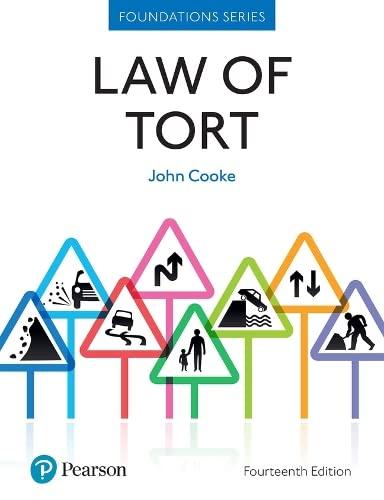Question
discuss about the followings matters 1.The facts 2.The issue 3.The judge's decision 4.The reasoning supporting the decision. 5.Conclusion CASE Donoghue v Stevenson [1932] AC 562
discuss about the followings matters
1.The facts
2.The issue
3.The judge's decision
4.The reasoning supporting the decision.
5.Conclusion
CASE
Donoghue v Stevenson[1932] AC 562
On Sunday 26th August 1928 May Donoghue sat in a caf with a friend. The friend ordered and paid for some ginger beer, which came in a bottle made from dark opaque glass. Donoghue drank some of the contents then her friend proceeded to pour the remainder of the contents of the bottle into the tumbler when a snail, which was beginning to rot, floated out of the bottle.
Mrs. Donoghue claimed that she was made ill both by what she had seen and by what she feared she had eaten: namely, the rotting carcass of a presumed gastropod. She later fell ill and a physician diagnosed her with gastroenteritis. She commenced a claim against the manufacturer of the ginger beer.
The case went all the way to the House of Lords where they ruled for Donoghue. It was the speech of Lord Atkins that was most influential. He said :
``You must take reasonable care to avoid acts or omissions which you can reasonably foresee would be likely to injure your neighbour. Who, then, in law is my neighbour? The answer seems to be - persons who are so closely and directly affected by my act that I ought reasonably to have them in contemplation as being so affected when I am directing my mind to the acts or omissions which are called in question.''
This `neighbour principle' was, and to a certain extent still is, the foundation of the modern law.
Step by Step Solution
There are 3 Steps involved in it
Step: 1

Get Instant Access to Expert-Tailored Solutions
See step-by-step solutions with expert insights and AI powered tools for academic success
Step: 2

Step: 3

Ace Your Homework with AI
Get the answers you need in no time with our AI-driven, step-by-step assistance
Get Started


